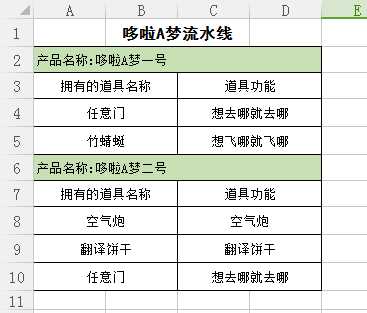标签:family ora 产品 难度 private var 渐进 color static
注:本文代码在第一篇文章基础上修改而成,请务必先阅读第一篇文章。
http://www.cnblogs.com/foxlee1024/p/7616987.html
本文也不会过多的讲解模板中遍历表达式的写法和说明,请先阅读第二篇文章。
http://www.cnblogs.com/foxlee1024/p/7617120.html
原本第三篇文章我打算写sheet分页的实现的,后来发现难度比第四篇循环嵌套复杂一点点,我们本着循序渐进的原则,所以先讲讲怎么实现循环嵌套。
说明是嵌套循环?说白了就是大循环套小循环,请看下图:

我们设想一下,有一条哆啦A梦的流水生产线,生产线上在生成这哆啦A梦。我们知道,哆啦A梦的口袋中有很多不同的道具,那么我们在生成的时候就把这些道具预先放进哆啦A梦的口袋吧。
每一个产品的哆啦A梦拥有的道具都是不一样的,这样我们在表中就需要到了两个循环,第一层是哆啦A梦名称和拥有的道具,第二层循环是拥有的道具名称和道具功能。
Main方法中导出的代码和原来没什么不同,所以我们先看看哆啦A梦的javabean是怎么设计的。
public class Doraemon { private String name; // 哆啦A梦的名字 private List<Tool> tools; // 拥有的道具,这是一个链表,存放的是Tool类 public Doraemon(String name, List<Tool> tools) { super(); this.name = name; this.tools = tools; } public Doraemon() { } /** 以下省略所有get/set方法,请自行添加 */ }
接下来我们看看Tool类:
public class Tool { private String toolName; // 道具名 private String toolFunction; // 道具功能 public Tool(String toolName, String toolFunction) { super(); this.toolName = toolName; this.toolFunction = toolFunction; } public Tool() { } /** 以下省略所有get/set方法,请自行添加 */ }
现在大家看明白了吗?其实就是在Doraemon 类中加入了一个List链表,泛型为Tool。可以预想的是,只要一层层创建好哆啦A梦这个对象(包括他的道具)后,再把多个多啦A梦放进一个链表中,然后传给Jxls工具就可以生成excel报表了。
现在我们看看Main方法是怎么写的,除了生成哆啦A梦对象的代码外,其他完全没有改动。
public class TestMain2 { public static void main(String[] args) throws Exception { String templatePath = "E:/template6.xls"; OutputStream os = new FileOutputStream("E:/out6.xls"); Tool tool1 = new Tool("任意门","想去哪就去哪"); Tool tool2 = new Tool("竹蜻蜓","想飞哪就飞哪"); Tool tool3 = new Tool("空气炮","空气炮"); Tool tool4 = new Tool("翻译饼干","翻译饼干"); List<Doraemon> list = new ArrayList<Doraemon>(); //制作一个哆啦A梦 Doraemon doraemon1 = new Doraemon(); //制作一号哆啦A梦的道具 List<Tool> toolList1 = new ArrayList<Tool>(); toolList1.add(tool1); toolList1.add(tool2); //设定一号哆啦A梦信息 doraemon1.setName("哆啦A梦一号"); doraemon1.setTools(toolList1); //制作一个哆啦A梦 Doraemon doraemon2 = new Doraemon(); //制作二号哆啦A梦的道具 List<Tool> toolList2 = new ArrayList<Tool>(); toolList2.add(tool3); toolList2.add(tool4); toolList2.add(tool1); //设定二号哆啦A梦信息 doraemon2.setName("哆啦A梦二号"); doraemon2.setTools(toolList2); list.add(doraemon1); list.add(doraemon2); Map<String, Object> model = new HashMap<String, Object>(); model.put("data", list); JxlsUtils.exportExcel(templatePath, os, model); os.close(); System.out.println("完成"); } }
Main方法不多解释,就是new出一个新的哆啦A梦后给他set入对应的数据(包括名字和拥有的道具),然后把一众哆啦A梦放进一个链表中,再传进model中。
重点是我们看看模板应该怎么写。

第一句不用多说,设定模板区域(我随便写的,可以写大一点):
jx:area(lastCell="I7")
第二句是第一层循环,items是Main方法中model放入的键名,里面存放有装着生产线所有哆啦A梦对象的一个链表。他的var值是dora,在获取产品名称时就要写成${dora.name}。lastCell的值写C4,D4都行。
jx:each(items="data" var="dora" lastCell="D4")
第三句是第二层循环,是哆啦A梦对象(Doraemon)里的tools属性,是个链表。由于上一层循环中Doraemon对象已经在var值中被命名成dora,所以第二层循环的items写成dora.tools。并且var值为tool。这就意味着Doraemon对象tools属性中的单条遍历记录被命名成tool。所以就可以在表达式中用${tool.toolName}方法获取道具的名字(toolName)了。
jx:each(items="dora.tools" var="tool" lastCell="D4")
不明白的同学请仔细品味一下,items相当于一个链表List,而var相当于链表中存放的单个对象。要使用这些对象就要给他们在var中命名。
写好这三句注解后,就可以回到main方法中执行代码了。

标签:family ora 产品 难度 private var 渐进 color static
原文地址:http://www.cnblogs.com/foxlee1024/p/7618264.html